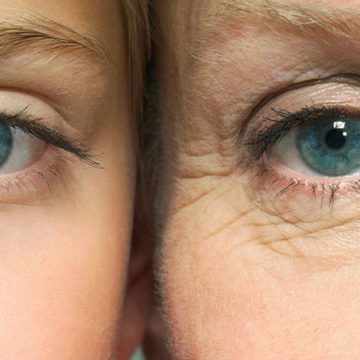
- Collagen breakdown speeds up as we age, but consuming collagen may help reverse this decline.
- We know our bodies don’t have enough collagen when we start forming wrinkles, we develop knee pains, and we start having gut issues.
- The best way to ensure your body has enough collagen is by feeding it enough protein and nutrients.
Collagen has become one of today’s most popular supplements and beauty product ingredients that claims to promote overall skin health. Our bodies actually make collagen. It is the most abundant protein in our body that is found in the bones, muscles, tendons, ligaments, organs, blood vessels, skin, intestinal lining and connective tissues.
Because of a growing number of studies that suggest collagen is effective for relieving joint pain, strengthening hair, improving gut health and fighting off wrinkles, the question is, shouldn’t’ we all be buying or consuming collagen?
Answer: Not necessarily. It’s important to know first if your body is producing sufficient collagen on its own.
When Collagen Stores Decrease

Throughout our lives, collagen is broken down and replaced. But collagen breakdown speeds up as we get older. It starts in our mid to late 20s, leading to various conditions we normally accept as a part of aging. These include:
- Loss of skin elasticity. Wrinkles start to form and wounds heal more slowly.
- Stiffer tendons and ligaments causing loss of flexibility.
- Muscle mass decreases, making you weaker.
- Cartilage degenerates due to overuse, resulting in osteoarthritis.
- Intestinal lining becomes thinner. You may have more digestion issues.
Poor diet however, is the main reason people don’t have enough collagen. If the body lacks the essential elements such as amino acids, needed to process them, collagen cannot be made.
How collagen is produced

For the body to create collagen, it combines amino acids then reprocessed or reused into collagen. Good sources of amino acids include eating protein-filled foods such as meat, beans and dairy products.
During the reprocessing stage, the body uses vitamin C, zinc, and copper, all nutrients that make up a healthy diet. Sources of vitamin C include citrus fruits, tomatoes, broccoli, and greens while you can get your minerals from meats, shellfish, nuts, beans and whole grains. Consuming dietary supplements and modifying your diet may help your body have enough ingredients for collagen production.
But as we age, these nutrients may no longer be absorbed properly by the body. To help your body have enough nutrients needed for collagen production, modifying your diet may be the best strategy.
Top Foods for Restoring Collagen

Beef, chicken, fish, and eggs, beans and legumes are good sources of amino acids. But bone broth is best for building collagen. By simmering bones in water between 12 to 48 hours in a crockpot or on the stove, collagen is extracted from beef, chicken or fish bones.
You can also opt for organic bone broth in order to reduce the residue of pesticides, and other contaminants in your broth.
Gelatin, which comes from collagen, can also increase your body’s ability to make collagen.
Collagen Supplements to take

Eating fresh, organic foods is the best way of replenishing your body with nutrients. But consuming collagen in the supplement form is also a good source especially during travel, work or eating on the run.
It’s better if you go for the powder form. Usually, hydrolyzed collagen (or “collagen peptide”) powder has no flavor and is easily dissolved in beverages, smoothies and soups.
Revitalizing Your Skin

The skin is the body’s largest organ and a proven and effective way of keeping your organs healthy is a healthful diet. Since the skin reflects your inner health, the same way you feed your body’s collagen stores will nourish your skin as well.
Take note however that lack of collagen isn’t the sole cause of skin damage. Rather, prolonged exposure to the UV rays of the sun. Replenishing collagen may not be able to reverse sun damage.
Source: Very Well Health
